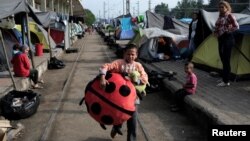Migrants and refugees are being freed from detention centers in Greece but remain trapped on its islands until their asylum requests are processed, exposing them to dire living conditions and even the risk of people smugglers, human rights groups say.
At least 1,100 people have been released from centers on three islands and more will follow as their 25-day detention limit expires, police officials said. They are forbidden from travelling to the mainland, where most state-run shelters are.
Some 8,000 people, many escaping the Syrian war, have arrived on boats from Turkey since March and are held under a European Union deal with Ankara designed to seal off the main route into Europe for over a million people since 2015.
Under the deal, those who do not seek asylum in Greece — and those who are rejected — will be sent back to Turkey. Asylum applications are piling up and rulings can take weeks.
The United Nations refugee agency UNHCR said it was supporting government efforts to create new spaces.
"All parties are working very hard to meet the needs of the human beings present on Greek islands," said Chris Boian, a spokesman in Greece. Asked if those stranded on the islands were vulnerable to human traffickers offering to take them to the mainland, Boian said: "The risk does exist and that is the one reason UNHCR advocates full access to asylum and expansion of the asylum service and alternative legal entry channels [to Europe]."
Human rights groups said the government was not doing enough to provide asylum seekers with shelter and medical care while they wait. On Lesbos, many head to an open, municipality-run site. Those who can afford it check into hotels. Others sleep in the open.
"Every country that asks people to wait in a certain place has to provide them with basic facilities. That's not done by Greece," said Amnesty International's deputy Europe director, Gauri van Gulik. "It's either — you're in prison, or you can sleep rough on an island," she told Reuters.
A government spokesman, Giorgos Kyritis, said the government was doing its best to support refugees and migrants in Greece at the open reception centers, nearly all of which are on the mainland.
"The government cannot afford to support these people financially on an individual basis. It's doing whatever it can to support them in the context of its limited capabilities," he said.





